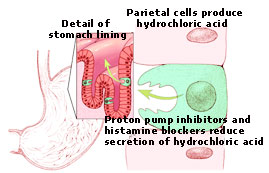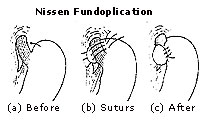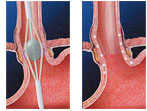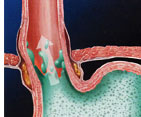|
|
Top 10 Heartburn Treatments
Untreated acid reflux can lead to complications, including
esophageal cancer. Listed below are the ten most often used treatments for acid
reflux.
 Mostly
heartburn symptoms are related to specific foods.
Therefore, it is important that heartburn suffers manage their diets as a way to
treat their heartburn. There are foods that are usually pretty safe for
heartburn sufferers to eat, that have little risk of causing acid reflux, while
other foods should be avoided as they are major heartburn triggers. Mostly
heartburn symptoms are related to specific foods.
Therefore, it is important that heartburn suffers manage their diets as a way to
treat their heartburn. There are foods that are usually pretty safe for
heartburn sufferers to eat, that have little risk of causing acid reflux, while
other foods should be avoided as they are major heartburn triggers.
Foods to avoid if you suffer from acid reflux:
-
Fried foods
-
Fatty foods

-
Citrus fruits
-
Tomato products
-
Coffee
-
Alcoholic beverages
-
Citrus fruit drinks

-
Chocolate
-
Peppermint
-
Pepper
|
 Histamine Receptor Antagonists - Over-the-counter Remedy : Histamine Receptor Antagonists - Over-the-counter Remedy :
|
|
|
|
 This type of drug works by decreasing the amount of acid the
stomach produces, and is used to treat conditions in which the stomach produces
too much acid and conditions in which acid comes up into the esophagus and
causes heartburn, such as gastroesophageal reflux disease, or (also known as
acid reflux disease). Axid, Pepcid and Zantac are in a class of drugs called
histamine receptor antagonists. They works by decreasing the amount of acid the
stomach produces, and are used to treat conditions in which acid comes up into
the esophagus and causes heartburn, such as gastroesophageal reflux disease (GERD). This type of drug works by decreasing the amount of acid the
stomach produces, and is used to treat conditions in which the stomach produces
too much acid and conditions in which acid comes up into the esophagus and
causes heartburn, such as gastroesophageal reflux disease, or (also known as
acid reflux disease). Axid, Pepcid and Zantac are in a class of drugs called
histamine receptor antagonists. They works by decreasing the amount of acid the
stomach produces, and are used to treat conditions in which acid comes up into
the esophagus and causes heartburn, such as gastroesophageal reflux disease (GERD).
|
 Antacids - Over-the-counter
Remedy
: Antacids - Over-the-counter
Remedy
:
|
|
|
|
 Antacids work by neutralizing acid in the stomach. Antacids
neutralize acid on contact to provide heartburn relief. Tagamet and
Mylanta work by decreasing the amount of acid the stomach produces. They are
available in over-the-counter form. Tagamet It is also known by its generic
name, Cimetidine (pronunced sye MEH ti deen) Antacids work by neutralizing acid in the stomach. Antacids
neutralize acid on contact to provide heartburn relief. Tagamet and
Mylanta work by decreasing the amount of acid the stomach produces. They are
available in over-the-counter form. Tagamet It is also known by its generic
name, Cimetidine (pronunced sye MEH ti deen)
|
 Proton Pump
Inhibitors - Prescription Medications
: Proton Pump
Inhibitors - Prescription Medications
:
|
|
|
|
 Proton pump inhibitors (PPIs) are a group of prescription
medications that prevent the release of acid in the stomach and intestines.
Doctors prescribe PPIs to treat people with heartburn (acid reflux), ulcers of
the stomach or intestine, or excess stomach acid (Zollinger-Ellison Syndrome).
Aciphex, Nexium, Prevacid decreases the amount of acid produced in your
stomach. These are used to treat ulcers, gastroesophageal reflux disease (GERD
or heartburn). Proton pump inhibitors (PPIs) are a group of prescription
medications that prevent the release of acid in the stomach and intestines.
Doctors prescribe PPIs to treat people with heartburn (acid reflux), ulcers of
the stomach or intestine, or excess stomach acid (Zollinger-Ellison Syndrome).
Aciphex, Nexium, Prevacid decreases the amount of acid produced in your
stomach. These are used to treat ulcers, gastroesophageal reflux disease (GERD
or heartburn).
|
 Promotility Agents
: Promotility Agents
:
|
|
|
|
Promotility agents are used to improve GERD symptoms for patients
with slow gastric emptying. They speed digestion, which prevents acid from
staying in the stomach too long. They may also be used for patients with GERD
when therapy with H2 blockers or PPIs does not work. Reglan (Metoclopramide) is
in a group called Promotility Agents, and are used to improve GERD symptoms for
patients with slow gastric emptying. They speed digestion, which prevents acid
from staying in the stomach too long. They may also be used for patients with
GERD when therapy with H2 blockers or Proton Pump Inhibitors (PPIs) does not
work. emptying. They speed digestion, which prevents acid from
staying in the stomach too long. They may also be used for patients with GERD
when therapy with H2 blockers or PPIs does not work. Reglan (Metoclopramide) is
in a group called Promotility Agents, and are used to improve GERD symptoms for
patients with slow gastric emptying. They speed digestion, which prevents acid
from staying in the stomach too long. They may also be used for patients with
GERD when therapy with H2 blockers or Proton Pump Inhibitors (PPIs) does not
work.
 Alternative Treatments: Alternative Treatments:
|
|
|
|
For many chronic acid reflux sufferers, they want an alternate,
natural way of treating their acid reflux. These range from folk and homeopathic
remedies to healthy diets to lifestyle changes. Supplements like calcium
carbonate, licorice, aloe vera juice are recommended for immediate relief of
heartburn symptoms.
-
Fresh ginger can be ground and added to foods or taken in tea or
capsule form. Herbalists recommend consuming 500mg. of ginger with a full glass
of water after each meal.
-
 Herbal teas containing even trace amounts of peppermint,
chamomile, ginger, licorice root and catnip help the stomach lining repair
itself. Often, one cup of tea following dinner is enough to stave off future
heartburn episodes. Herbal teas containing even trace amounts of peppermint,
chamomile, ginger, licorice root and catnip help the stomach lining repair
itself. Often, one cup of tea following dinner is enough to stave off future
heartburn episodes.
-
Drink at least 8-glasses of water each day to rid the body of
toxins and allow your body to expel acid naturally.
-
Papaya enzymes are sold in chewable capsule form, and are taken
immediately following a meal with a full glass of water.
-
Consuming more fiber nutrient foods is another natural way to
alleviate future suffering.
 Nissen
Fundoplication: Nissen
Fundoplication:
|
|
|
|
The laparoscopic surgery for treatment of GERD, fundoplication,
involves constructing a new "valve" between the esophagus and the stomach by
wrapping the upper portion of the stomach (the fundus) around the lowest port of
the esophagus. The surgery is conducted under general
anesthesia. Small incisions are made in the abdomen, including one to admit the
laparoscope or microcamera, which affords the surgeon a magnified, detailed view
of the affected areas. If necessary, the surgeon first applies sutures to
tighten the hiatus (opening) in the diaphragm, in order to stabilize the stomach
and lower esophagus. In the main operation, the adjacent portion of the stomach
is wrapped once around the esophagus and sutured in position, creating a one-way
valve that allows food to pass into the stomach while preventing gastric
contents from backing up in the other direction. a new "valve" between the esophagus and the stomach by
wrapping the upper portion of the stomach (the fundus) around the lowest port of
the esophagus. The surgery is conducted under general
anesthesia. Small incisions are made in the abdomen, including one to admit the
laparoscope or microcamera, which affords the surgeon a magnified, detailed view
of the affected areas. If necessary, the surgeon first applies sutures to
tighten the hiatus (opening) in the diaphragm, in order to stabilize the stomach
and lower esophagus. In the main operation, the adjacent portion of the stomach
is wrapped once around the esophagus and sutured in position, creating a one-way
valve that allows food to pass into the stomach while preventing gastric
contents from backing up in the other direction.
Nissen fundoplication is an open surgery procedure requiring an incision 6 to
10 inches long. The hospital stay is about 10 days. Recovery is more painful on
account of the large scar, requiring as long as two months.
|
 Enteryx
Procedure: Enteryx
Procedure:
|
|
|
|
The Enteryx procedure involves the use of a polymer device and a
solvent that is implanted in the wall of the
cardia during an endoscopy. The aim
of the device is to assist in keeping stomach acid in the stomach, and not
letting it reflux up into the esophagus. It does this by strengthening the
muscle that separates the lower part of the esophagus from the stomach. After
this procedure patients may be able to reduce the medications they need to take
to improve their GERD symptoms. And in some cases, some patients may be able
medications may be eliminated entirely. implanted in the wall of the
cardia during an endoscopy. The aim
of the device is to assist in keeping stomach acid in the stomach, and not
letting it reflux up into the esophagus. It does this by strengthening the
muscle that separates the lower part of the esophagus from the stomach. After
this procedure patients may be able to reduce the medications they need to take
to improve their GERD symptoms. And in some cases, some patients may be able
medications may be eliminated entirely.
Using a endoscope, a doctor will inject a liquid polymer into the
muscle of the lower esophageal sphincter (LES) by the use of a needle catheter.
After the injection, the polymer will solidify into a sponge-like permanent
implant. This implant may help improve the barrier between the stomach and
esophagus, also called the gastro-esophageal junction, by supporting and
improving the elasticity of the lower esophageal sphinter. This will reduce, and
sometimes prevent, acid reflux into the esophagus.
|
 Stretta
Procedure: Stretta
Procedure:
|
|
|
|
|
|
The Stretta procedure is an approved technique for acid reflux
disease. The Stretta procedure uses radiofrequency energy delivered to the lower
esophageal sphincter and gastric cardia (uppermost part of the stomach) which
improves the function of the LES. This will lead to tissue constriction and will
improve the thickness of the muscle wall in these areas. The result of this is a
reduction of the frequency of acid reflux because the frequency of LES
relaxations is reduced. Also, LES pressure is increased. This reduces the
occurrences of refluxed acid into the esophagus. procedure uses radiofrequency energy delivered to the lower
esophageal sphincter and gastric cardia (uppermost part of the stomach) which
improves the function of the LES. This will lead to tissue constriction and will
improve the thickness of the muscle wall in these areas. The result of this is a
reduction of the frequency of acid reflux because the frequency of LES
relaxations is reduced. Also, LES pressure is increased. This reduces the
occurrences of refluxed acid into the esophagus.
-
The catheter is placed through the mouth and into the valve
between the stomach and the esophagus.
-
The physician then delivers safe, controlled levels of
radiofrequency (RF) energy to the LES muscle and the gastric cardia (uppermost
part of the stomach) to create thermal lesions.
-
When the lesions heal, the barrier function of the LES is
improved reducing the frequency and severity of reflux.
The Stretta Procedure is usually performed when heartburn symptoms can't be
controlled by medications. The recovery time is brief, and most patients can
return to their normal routines the next day.
Note: It's important that you discuss any treatment options with
your doctor before adopting them.
|
Related Links
|
|
|
|
|

 Herbal teas containing even trace amounts of peppermint,
chamomile, ginger, licorice root and catnip help the stomach lining repair
itself. Often, one cup of tea following dinner is enough to stave off future
heartburn episodes.
Herbal teas containing even trace amounts of peppermint,
chamomile, ginger, licorice root and catnip help the stomach lining repair
itself. Often, one cup of tea following dinner is enough to stave off future
heartburn episodes. 



 heartburn is lifestyle changes. Heartburn symptoms can often be
relieved if sufferers make a few of these lifestyle changes
heartburn is lifestyle changes. Heartburn symptoms can often be
relieved if sufferers make a few of these lifestyle changes Mostly
heartburn
Mostly
heartburn 
 This type of drug works by decreasing the amount of acid the
stomach produces, and is used to treat conditions in which the stomach produces
too much acid and conditions in which acid comes up into the esophagus and
causes heartburn, such as gastroesophageal reflux disease, or (also known as
acid reflux disease). Axid, Pepcid and Zantac are in a class of drugs called
histamine receptor antagonists. They works by decreasing the amount of acid the
stomach produces, and are used to treat conditions in which acid comes up into
the esophagus and causes heartburn, such as gastroesophageal reflux disease (GERD).
This type of drug works by decreasing the amount of acid the
stomach produces, and is used to treat conditions in which the stomach produces
too much acid and conditions in which acid comes up into the esophagus and
causes heartburn, such as gastroesophageal reflux disease, or (also known as
acid reflux disease). Axid, Pepcid and Zantac are in a class of drugs called
histamine receptor antagonists. They works by decreasing the amount of acid the
stomach produces, and are used to treat conditions in which acid comes up into
the esophagus and causes heartburn, such as gastroesophageal reflux disease (GERD). Proton pump inhibitors (PPIs) are a group of prescription
medications that prevent the release of acid in the stomach and intestines.
Doctors prescribe PPIs to treat people with heartburn (acid reflux), ulcers of
the stomach or intestine, or excess stomach acid (Zollinger-Ellison Syndrome).
Aciphex, Nexium, Prevacid decreases the amount of acid produced in your
stomach. These are used to treat ulcers, gastroesophageal reflux disease (GERD
or heartburn).
Proton pump inhibitors (PPIs) are a group of prescription
medications that prevent the release of acid in the stomach and intestines.
Doctors prescribe PPIs to treat people with heartburn (acid reflux), ulcers of
the stomach or intestine, or excess stomach acid (Zollinger-Ellison Syndrome).
Aciphex, Nexium, Prevacid decreases the amount of acid produced in your
stomach. These are used to treat ulcers, gastroesophageal reflux disease (GERD
or heartburn). emptying. They speed digestion, which prevents acid from
staying in the stomach too long. They may also be used for patients with GERD
when therapy with H2 blockers or PPIs does not work. Reglan (Metoclopramide) is
in a group called Promotility Agents, and are used to improve GERD symptoms for
patients with slow gastric emptying. They speed digestion, which prevents acid
from staying in the stomach too long. They may also be used for patients with
GERD when therapy with H2 blockers or Proton Pump Inhibitors (PPIs) does not
work.
emptying. They speed digestion, which prevents acid from
staying in the stomach too long. They may also be used for patients with GERD
when therapy with H2 blockers or PPIs does not work. Reglan (Metoclopramide) is
in a group called Promotility Agents, and are used to improve GERD symptoms for
patients with slow gastric emptying. They speed digestion, which prevents acid
from staying in the stomach too long. They may also be used for patients with
GERD when therapy with H2 blockers or Proton Pump Inhibitors (PPIs) does not
work. a new "valve" between the esophagus and the stomach by
wrapping the upper portion of the stomach (the fundus) around the lowest port of
the esophagus. The surgery is conducted under general
anesthesia. Small incisions are made in the abdomen, including one to admit the
laparoscope or microcamera, which affords the surgeon a magnified, detailed view
of the affected areas. If necessary, the surgeon first applies sutures to
tighten the hiatus (opening) in the diaphragm, in order to stabilize the stomach
and lower esophagus. In the main operation, the adjacent portion of the stomach
is wrapped once around the esophagus and sutured in position, creating a one-way
valve that allows food to pass into the stomach while preventing gastric
contents from backing up in the other direction.
a new "valve" between the esophagus and the stomach by
wrapping the upper portion of the stomach (the fundus) around the lowest port of
the esophagus. The surgery is conducted under general
anesthesia. Small incisions are made in the abdomen, including one to admit the
laparoscope or microcamera, which affords the surgeon a magnified, detailed view
of the affected areas. If necessary, the surgeon first applies sutures to
tighten the hiatus (opening) in the diaphragm, in order to stabilize the stomach
and lower esophagus. In the main operation, the adjacent portion of the stomach
is wrapped once around the esophagus and sutured in position, creating a one-way
valve that allows food to pass into the stomach while preventing gastric
contents from backing up in the other direction.  procedure uses radiofrequency energy delivered to the lower
esophageal sphincter and gastric cardia (uppermost part of the stomach) which
improves the function of the LES. This will lead to tissue constriction and will
improve the thickness of the muscle wall in these areas. The result of this is a
reduction of the frequency of acid reflux because the frequency of LES
relaxations is reduced. Also, LES pressure is increased. This reduces the
occurrences of refluxed acid into the esophagus.
procedure uses radiofrequency energy delivered to the lower
esophageal sphincter and gastric cardia (uppermost part of the stomach) which
improves the function of the LES. This will lead to tissue constriction and will
improve the thickness of the muscle wall in these areas. The result of this is a
reduction of the frequency of acid reflux because the frequency of LES
relaxations is reduced. Also, LES pressure is increased. This reduces the
occurrences of refluxed acid into the esophagus. 